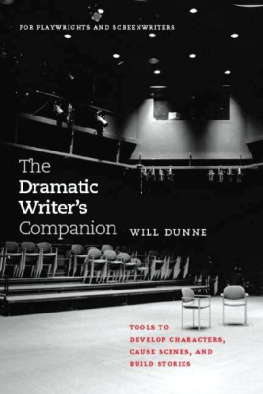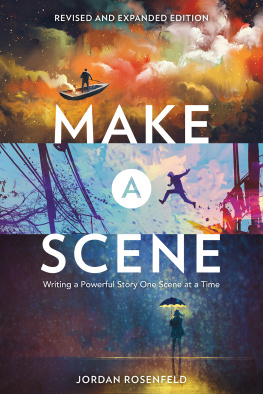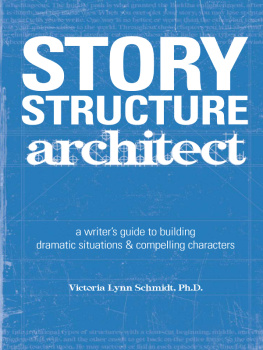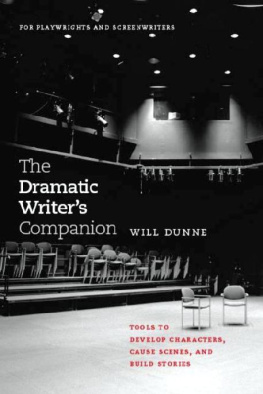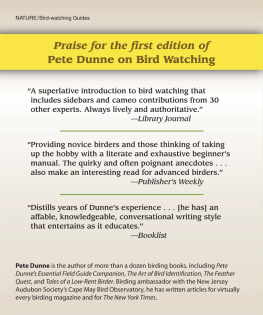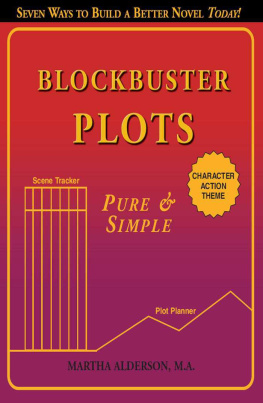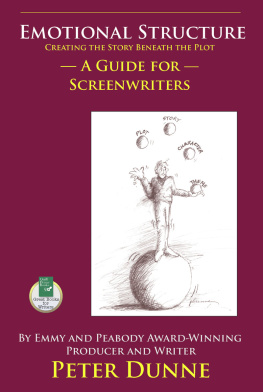Will Dunne - Character, Scene, and Story : New Tools from the Dramatic Writers Companion
Here you can read online Will Dunne - Character, Scene, and Story : New Tools from the Dramatic Writers Companion full text of the book (entire story) in english for free. Download pdf and epub, get meaning, cover and reviews about this ebook. year: 2020, genre: Home and family. Description of the work, (preface) as well as reviews are available. Best literature library LitArk.com created for fans of good reading and offers a wide selection of genres:
Romance novel
Science fiction
Adventure
Detective
Science
History
Home and family
Prose
Art
Politics
Computer
Non-fiction
Religion
Business
Children
Humor
Choose a favorite category and find really read worthwhile books. Enjoy immersion in the world of imagination, feel the emotions of the characters or learn something new for yourself, make an fascinating discovery.

- Book:Character, Scene, and Story : New Tools from the Dramatic Writers Companion
- Author:
- Genre:
- Year:2020
- Rating:5 / 5
- Favourites:Add to favourites
- Your mark:
- 100
- 1
- 2
- 3
- 4
- 5
Character, Scene, and Story : New Tools from the Dramatic Writers Companion: summary, description and annotation
We offer to read an annotation, description, summary or preface (depends on what the author of the book "Character, Scene, and Story : New Tools from the Dramatic Writers Companion" wrote himself). If you haven't found the necessary information about the book — write in the comments, we will try to find it.
Will Dunne: author's other books
Who wrote Character, Scene, and Story : New Tools from the Dramatic Writers Companion? Find out the surname, the name of the author of the book and a list of all author's works by series.
Character, Scene, and Story : New Tools from the Dramatic Writers Companion — read online for free the complete book (whole text) full work
Below is the text of the book, divided by pages. System saving the place of the last page read, allows you to conveniently read the book "Character, Scene, and Story : New Tools from the Dramatic Writers Companion" online for free, without having to search again every time where you left off. Put a bookmark, and you can go to the page where you finished reading at any time.
Font size:
Interval:
Bookmark:
Books by Will Dunne
The Dramatic Writers Companion: Tools to Develop Characters, Cause Scenes, and Build Stories
Character, Scene, and Story: New Tools from the Dramatic Writers Companion
The Architecture of Story: A Technical Guide for the Dramatic Writer
WILL DUNNE
THE UNIVERSITY OF CHICAGO PRESS
CHICAGO AND LONDON
The University of Chicago Press, Chicago 60637
The University of Chicago Press, Ltd., London
2017 by Will Dunne
All rights reserved. No part of this book may be used or reproduced in any manner whatsoever without written permission, except in the case of brief quotations in critical articles and reviews. For more information, contact the University of Chicago Press, 1427 E. 60th St., Chicago, IL 60637.
Published 2017
Printed in the United States of America
26 25 24 23 22 21 20 19 18 17 1 2 3 4 5
ISBN -13: 978-0-226-39347-6 (cloth)
ISBN -13: 978-0-226-39350-6 (paper)
ISBN -13: 978-0-226-39364-3 (e-book)
DOI : 10.7208/chicago/9780226393643.001.0001
Library of Congress Cataloging-in-Publication Data
Names: Dunne, Will, author. | Supplement to (work): Dunne, Will. Dramatic writers companion.
Title: Character, scene, and story : new tools from The dramatic writers companion / Will Dunne.
Description: Chicago ; London : The University of Chicago Press, 2017.
Identifiers: LCCN 2017008987 | ISBN 9780226393476 (cloth : alk. paper) | ISBN 9780226393506 (pbk. : alk. paper) | ISBN 9780226393643 (e-book)
Subjects: LCSH : DramaTechniqueHandbooks, manuals, etc. | DramaTechniqueProblems, exercises, etc. | PlaywritingHandbooks, manuals, etc. | PlaywritingProblems, exercises, etc. | AuthorshipHandbooks, manuals, etc. | AuthorshipProblems, exercises, etc. | Motion picture authorshipHandbooks, manuals, etc. | Motion picture authorshipProblems, exercises, etc.
Classification: LCC PN 1661 . D 859 2017 | DDC 808.2dc23 LC record available at https://lccn.loc.gov/2017008987
 This paper meets the requirements of ANSI/NISO Z 39.48-1992 (Permanence of Paper).
This paper meets the requirements of ANSI/NISO Z 39.48-1992 (Permanence of Paper).
For RUSS TUTTEROW,
the godfather of
Chicago playwriting
STAGE FLESHING OUT THE BONES
Use an interview process to uncover information about your character in a dramatic wayfrom the characters perspective and in the characters voice.
Explore your characters credo: what key beliefs it includes, how these beliefs arose, and what impact they might have on the dramatic journey.
Characters tend to be emotional beings. Learn more about your characters by exploring their dominant emotions and how they might translate into dramatic elements.
Whether or not your characters mother and father are in the story, they have probably played a critical role in shaping his or her physical, psychological, and social makeup. Use this exercise to learn more about your characters parents and how they might influence story events.
STAGE GETTING TO KNOW THE CHARACTER BETTER
Sense memory is a technique in which actors recall a specific physical detail from a past experience in order to relive the experience emotionally. Writers can use a similar technique to trigger emotional truths about their characters.
If to err is to be human, you can ground your character in humanity by identifying his or her weaknesses, flaws, and limitations and exploring how these imperfections might contribute to story events.
What do objects and other physical elements reveal about your character? Explore the physical realm of your story to gain new insights about the character at two key points: the beginning and the end of the dramatic journey.
Though the audience never meets them, offstage characters can have a profound effect on story events. This exercise helps you identify the most important offstage characters in your story and why they matter.
Flesh out two characters at a specific time in the story and record your responses side by side so that you can easily compare them in telling categories, such as most important relationship, dominant emotion, and burning desire.
STAGE UNDERSTANDING WHO THE CHARACTER REALLY IS
Develop a fact sheet that highlights critical truths about your character that could affect how your story unfolds.
Find out more about a character by asking two other characters from your story to describe him or her. In the end, your findings may reveal important information about all three characters and their relationships.
What would your character write in a journal, secret letter, or other private document that he or she would never tell others? Use instinctive writing to explore a characters innermost thoughts and desires.
What characters do is often more important than what they say, especially when their actions contradict their words. Use this exercise to explore the doings of a characterbefore, during, and after the story.
STAGE MAKING THINGS HAPPEN
Discover new ideas for dramatic action by exploring a scenes physical life: the setting and whats in it.
A dramatic story depicts changes that occur as characters pursue their goals and deal with obstacles. But sometimes what doesnt change is also important. Use this exercise to explore how new circumstances and unwavering truths can both affect how a scene unfolds.
The backstory is everything that happened in the world of the characters before the story begins. The only parts of this backstory that matter, however, are those that influence the characters here and now. Use this exercise to explore how the past can force its way into the present to ignite dramatic action.
In drama, desire operates on three levels: story (what the character wants overall), scene (what the character wants at a particular time and place), and beat (what the character wants from moment to moment). Explore these different levels of desire and their impact on the dramatic action of a scene.
How might your character be his or her own worst enemy? Who else might pose an obstacle to the characters success? How might the setting or current situation add to the problem? Explore different types of conflicts that your character might face when pursuing a scenic objective.
Objective is what the character wants. Motivation is why the character wants it. Define a characters objective for a scene, and explore two levels of motivation to achieve it: the apparent reasons for the characters actions and the hidden reasons, whether conscious or subconscious.
Learn more about characters by exploring how they try to get what they want: what strategies and tactics they choose, how well they execute these actions, how they manage the unexpected, and how they act under rising pressure.
Some scenes divide into smaller units of action called French scenes, which are each demarcated by the entrance or exit of a character. Flesh out character motivations for arriving in a scene after it starts or leaving before it ends, and explore the results of such comings and goings.
STAGE REFINING THE ACTION
Color is a basic component of the physical realm that grounds your characters in the truths of the world they inhabit. Work intuitively to tap the power of color and find new ideas and insights for a scene.
Emotions tend to exist not in isolation but in layers. Explore the conscious and subconscious feelings that might influence the thoughts and actions of your characters as they interact here and now to cause a dramatic event.
We enter the lives of dramatic characters when they have compelling reasons to act without delay. Develop a scene by focusing on two of its fundamental elements: importance and urgency.
Font size:
Interval:
Bookmark:
Similar books «Character, Scene, and Story : New Tools from the Dramatic Writers Companion»
Look at similar books to Character, Scene, and Story : New Tools from the Dramatic Writers Companion. We have selected literature similar in name and meaning in the hope of providing readers with more options to find new, interesting, not yet read works.
Discussion, reviews of the book Character, Scene, and Story : New Tools from the Dramatic Writers Companion and just readers' own opinions. Leave your comments, write what you think about the work, its meaning or the main characters. Specify what exactly you liked and what you didn't like, and why you think so.

